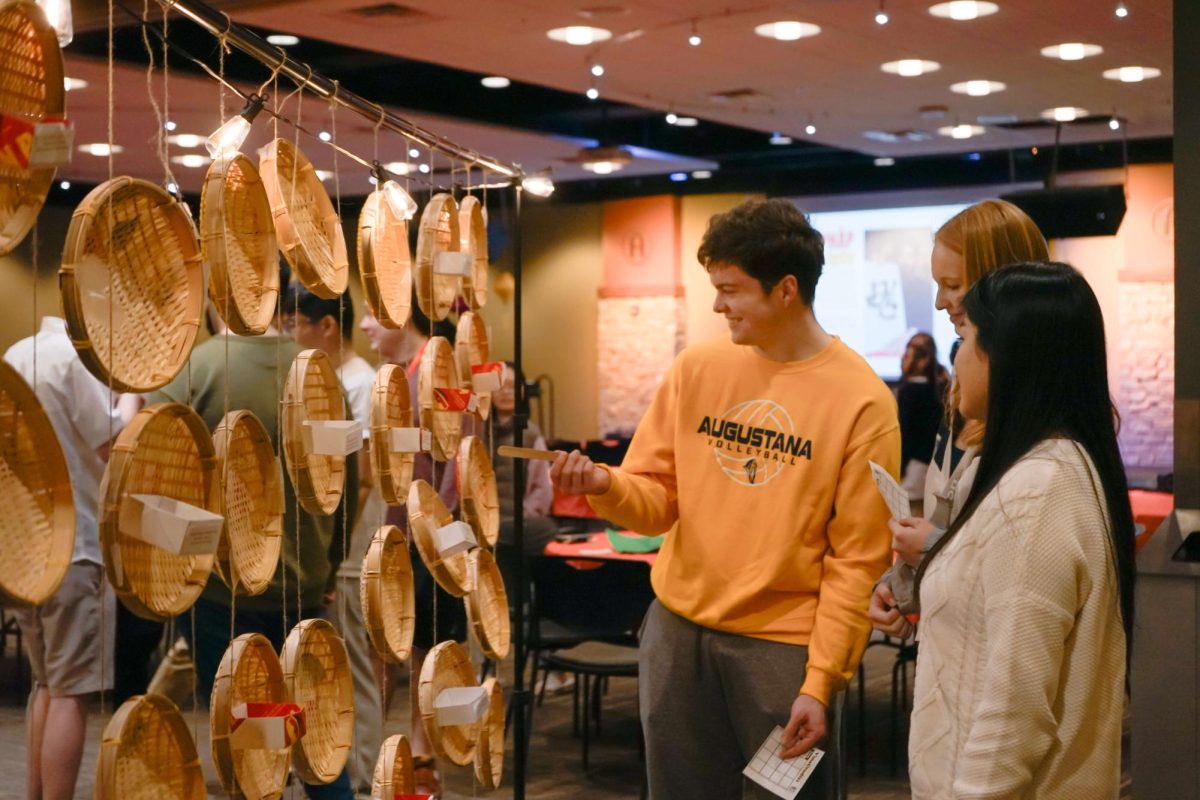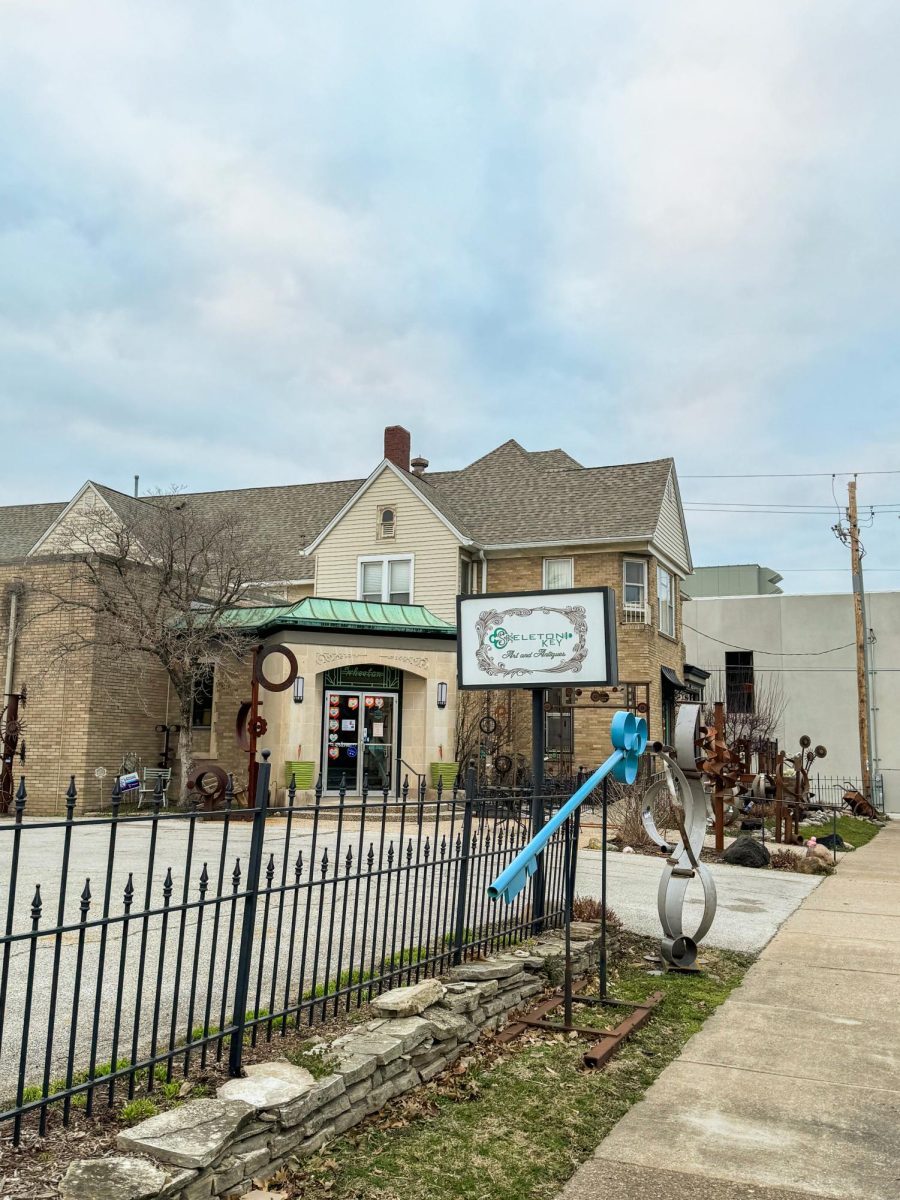
Photo courtesy of the Special Collections photo department.
Augustana students who started informal rush earlier this month have little chance of being driven out into a cornfield and having to walk back to campus like some Augustana alumnae in the past.
Pastor Richard Priggie remembers being kidnapped and having to go to a stranger’s house to use their phone.
Priggie, who pledged the Gamma Alpha Beta (GAB) fraternity in 1970, said one goal he had to accomplish was kidnap two active members without the chapter finding out. This is known as taking them on a “ride.”
“If you were unsuccessful, then you had to run, and the pledge class had to have a run, which means we had to line up in a single-file line and run around Rock Island with our pledge masters leading us,” said Priggie. “It was very tiring.”
He said he and a fellow active were once taken on a ride to “out in the middle of nowhere” in the middle of night, where they were dropped in a cornfield with no way back. The pair decided to go to a stranger’s house to use the occupant’s phone.
“It was pitch black, and just as we were coming up to the door, (the owner) walks around the side of the house with a shotgun,” said Priggie. “He actually was a nice guy and let us come in and use his phone to call our buddies.”
Pledging Process
Priggie said pledging for him lasted through all of spring term until the first or second week of fall term the following year.
“The actives could do anything they wanted during any hour of the day,” said Priggie.
One activity was collecting signatures from active members by sitting down with them or running errands for members, said Priggie.
“We came back as sophomores, and we were still pledges,” said Priggie. “It was long and drawn out.”
Describing his pledge class as a great and diverse group of guys, Priggie said that pledging for him was all about friendship.
“There were all sorts of wild and crazy (pledging activities), things that you’re probably not allowed to do today, which would be good,” said Priggie. “I’m not one of those guys that says ‘oh, this is the way it was, so it should be the same way.’ Not at all.”
His pledging included physically tiring activities that negatively impacted his studies.
“Running around the community, you got tired,” said Priggie.
Augustana’s current student handbook describes both “forced movement from one location to another” and “runs of any length,” as hazing, which would constitute a class A misdemeanor, the punishment being up to one year of jail and a maximum $2,500 fine.
During Priggie’s pledging days, the college had the Inter-Fraternity and Inter-Sorority councils, which were created during the 1922-23 school year to oversee the social groups and enforce the rules, according to the Observer archives.
Ken Brill, director of student life, said the college did not have a full-time adviser until 1986. Back then, pledging lasted 12-15 weeks, with a fall rush for sophomores only and a spring rush for first-years with no restrictions on the number of hours or weeks.
“The sophomores would still be pledging and would be doing skits while the chapters were recruiting for the spring, so they would still be pledging when first-year students were being recruited to be in the spring pledge class, just to illustrate how much pledging was going on around here,” said Brill.
Brill said in 1986, Jack Hullett, former dean of students, created the Greek Groups Study Committee made of Greek leaders, faculty members and administrators. The group decided that pledging should be eight weeks with the elimination of fall pledging. A similar group was formed in 2007 and 2013 to review Greek Life. Changes to this year’s pledging process can be found here.
“If you still do the same things the Augie community says isn’t right, then you’re going to become extinct,” said Brill. “It’s like, IBM isn’t making typewriters anymore.”
Brill said administration has been supportive of Greek life.
“The students probably think the administration is not supportive, but what the administration has always tried to do is create a certain set of circumstances for the Greeks, fraternities and sororities, so they can exist,” said Brill.
With time, there have been different levels of responsibility and accountability for students, said Brill.
“For instance, in 1975, there were things going on in Greek life I’m confident faculty members and administrators were aware of that in 1995 people would have been shocked by,” said Brill.
Priggie said one of the constant issues in pledging is alcohol abuse.
“My impression is it’s still an issue among Greeks, and it was back then, too,” said Priggie. “I think a lot of alcohol was consumed by underage drinkers, and to a certain extent, it was OK, but to a certain extent, it was outrageous and dangerous.”
Becky Dzik, who pledged the sorority Delta Chi Theta in 1987 and currently lives in Rockford, said the eight-week pledging process she went through did not have pledging hours, similar to Priggie’s experience. Instead, pledge moms and her big sister would tell her to be in her room at a specific time. Like Priggie, Dzik also had to get signatures from actives every week, making sure to carry their paddles and books at all times. Carrying pledge books and paddles in academic buildings is now prohibited, according to the current Greek Council new member policies.
Besides being warned about dirty rushing, which is promising a bid to a potential new member, Dzik does not remember being told about hazing.
“As far as hazing goes, in the sororities it did not seem to be a problem at all,” said Dzik.

Photo courtesy of the Special Collections photo database.
Hazing Incidents
Hazing at Augustana consists of activities which threaten a person’s physical, emotional and academic well being, that disrupt community life and that encourages the violation of criminal law or Augustana policies, as defined by the Student Faculty Administration Relations Committee in 1977 under the orders of President Thomas Tredway, according to the Observer archives. One such violation occurred during last year’s pledging period.
A.J. Wright, a sophomore at Kent State University who pledged the Gamma Alpha Beta (GAB) fraternity last year before leaving the college due to academic reasons, said he experienced hazing. Wright pledged for the first week and left after the first day of the second week. During that first week, GAB pledges were up until approximately 3 a.m. or later.
“We were up extremely late,” said Wright. “Much later than the average college student.
He said that while being quizzed on the history of the fraternity, he and the other pledges had to do physical activities while reciting information. Wright said he had to perform pushups, planks, wall sits and sit-ups.
“They were not only done a little bit,” said Wright. “We had to had to do them beyond exhaustion.”
Wright said that on the third day of pledging he had salt poured on one hand and an ice cube on the other and was told to put his hands together for two minutes. This causes a chemical reaction that burns.
“We could let go at any point, but we kept going,” said Wright.
He was told to drop the ice eventually.
“By no means is pledging supposed to be fun, but that is not effective in creating a brother if that is their goal,” said Wright, who joined a fraternity at Kent State.
Wright said that during a community adviser training meeting, he confided in a Greek Community Advisor (CA) that he was being hazed, asking her to not speak about his experiences so he could make a decision.
“I was stressed and tired and pretty much on the verge of breakdown,” said Wright.
The Tuesday of the second week of pledging, Wright was called in to see Katey Bignall, Greek life director, to discuss him being hazed.
“At that point, I had thought I was going to go through the process, but it is kind-of hard to go through the process and be accepted, much less continue it when you’re the reason why administration knows about what’s going on,” said Wright.
Wright said he hoped the chapter has changed.
“I do like the Greek system,” said Wright. “I like what I’m doing here, and I hope what happened to me was unique in that it doesn’t happen again, because (Greek Life) does work…they were just starting off wrong, and I hope they grow.”
After the incident was discovered, the GAB fraternity released a statement stating they have been working with administration to become “positive members of the Greek community.”
“It is important that we convey two things,” the fraternity said in the statement. “First, we regret our poor decisions, and secondly, we have learned from the experience. Our organization will move forward committed to integrity and bringing out the best in our members.”
At this time, the GAB fraternity could not be reached. Bignall declined to state what the sanctions against the GAB fraternity were.
This was not the first hazing violation incident at Augustana College. In 1993, the Pi Upsilon Gamma (PUG) fraternity was suspended for three years for using paddles regularly on pledges, said Brill.
Brill discovered the violation through a student, who asked to speak to him about possible hazing violations, showing Brill a journal recording every night of pledging.
“I was sick to my stomach by the end of it,” said Brill. “Almost everything they were doing was in violation of the rules.”
After the student agreed he wanted there to be consequences, Brill contacted Dean Evelyn Campbell and intervened with the leaders and pledges of the PUG fraternity separately, saying they would be charged with “a serious violation” of the hazing policy.
“It was really messy,” said Brill. “There were attorneys involved…and at one point President (Thomas) Tredway met with the group and said ‘You know, there’s really nothing you can do or say that’s going to save this fraternity at this point, but you can stand up and take responsibility as leaders of the chapter for what’s going on here, but if you continue to lie about what’s going on here, you’re going to be removed from the college,’” said Brill.
The PUG fraternity chose to deny the allegations, said Brill.
Along with the fraternity being suspended for a minimum of three years, the president, vice president and pledge master were suspended for a full year, able to re-apply for admission to winter term during the 1993-1994 school year, according to the Observer archives.
Culmination Week
Also known as Hell Week, Culmination Week is the final week of pledging since at least the 1940s. The term “Culmination Week” replaced the term “Hell Week” due to Hullett’s Greek Group Study Committee in 1986.
In 1949, the fraternities at the time had different themes with strict dress codes for Hell Week. The Beta Omega Sigma (BOS) fraternity pledges were the “little tough boys” and were forced to wear short pants and red bow ties; the Delta Omega Nu (DON) fraternity pledges were hunting for a big treasure chest with unknown treasure inside; the GAB fraternity pledges were “babies” dressed in blue bonnets and pink night gowns and would have to crawl around campus.
The Omicron Sigma Omicron (OZO) fraternity pledges were grease-themed, “with white shirts and more grease;” the Phi Omega Phi (Poobah) fraternity pledges were dressed as Indians; the PUG fraternity pledges were convicts; the Rho Nu Delta (Roundel) fraternity pledges were tramps, dressing up like hobos.
During Hell Night in 1948, fraternities had their pledges complete tasks that would all be considered hazing.
The PUG pledges had to walk back from north of Bettendorf on Friday while having to clean a house on Friday. The OZO pledges walked through Black Hawk State Park, past the Moline airport and through several “rural areas.”
The Roundel pledges had to perform in two restaurants, then were dropped off beyond Le Claire, Iowa. The DON pledges ate chocolate, sugar and garlic at the same time, with paddling and a work out, along with being artificially tanned with leg makeup.
The BOS pledges sang to the women’s dormitory, dropped eggs into each other’s mouths, directed traffic in Davenport and then were dropped off away from Augustana, according to the Observer archives.
When Pastor Richard Priggie was pledging in 1970, his Hell Night, the last night of pledging, was an all-nighter. He said he went to a GAB alumnus’s house, describing the night as “grueling.”
“They had us do all sorts of activities, like physical exercise, and the idea was it was bonding or something,” said Priggie. “I guess I could buy it to a certain extent, but to a certain extent I don’t buy it. It was a little bit just over the top.”


















































































































timothyburnett11 • Jan 30, 2015 at 11:02 am
This article does a great job at highlighting the areas Greek life can improve. While it is important to understand weaknesses, this would have been a stronger article with a wider range of speakers. The two most recent Greek Council presidents and their positive impact is largely unrecognized in this piece.